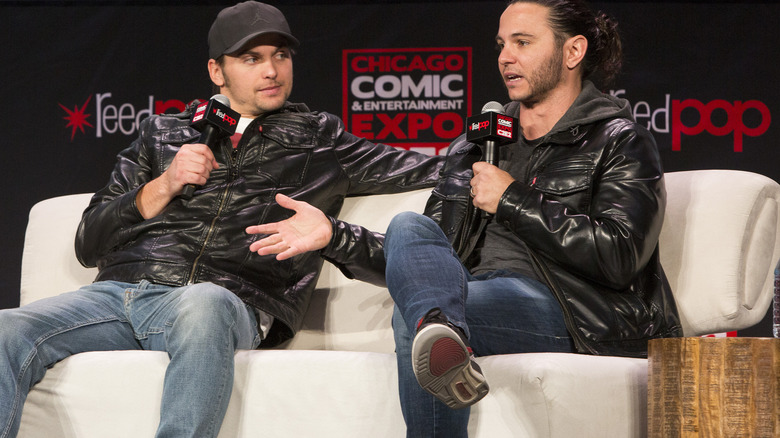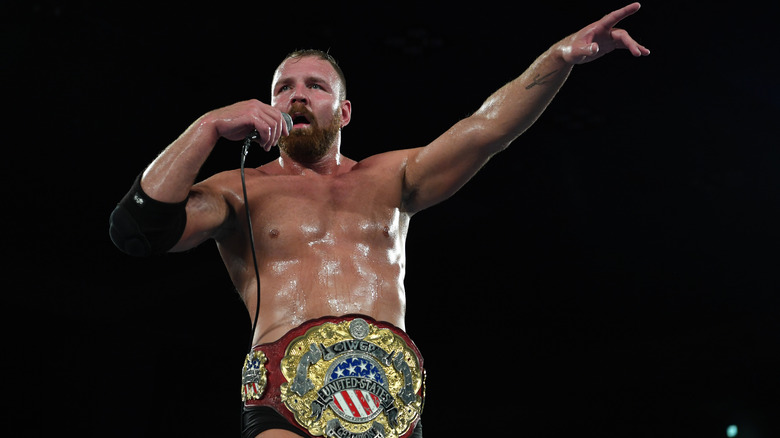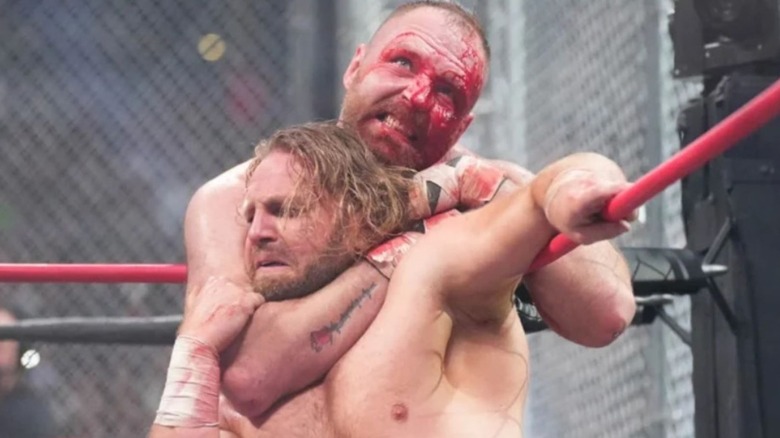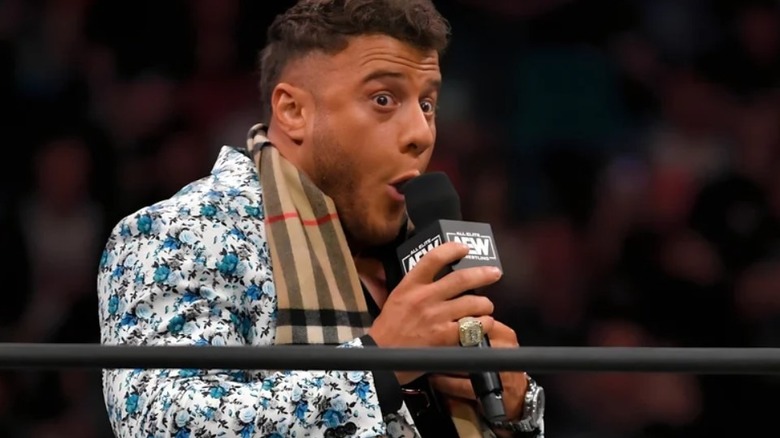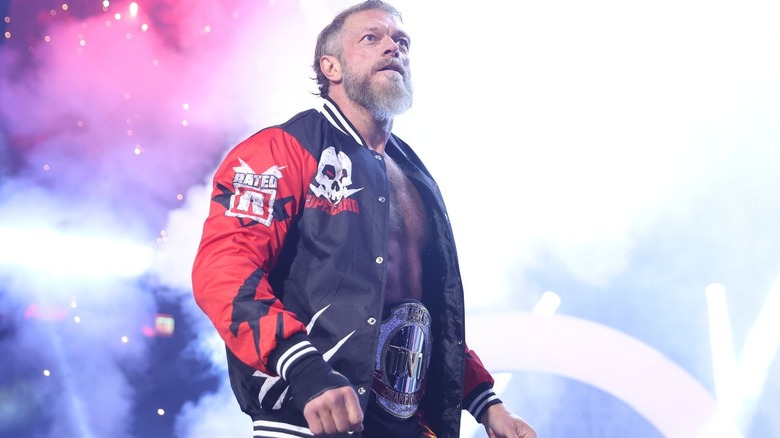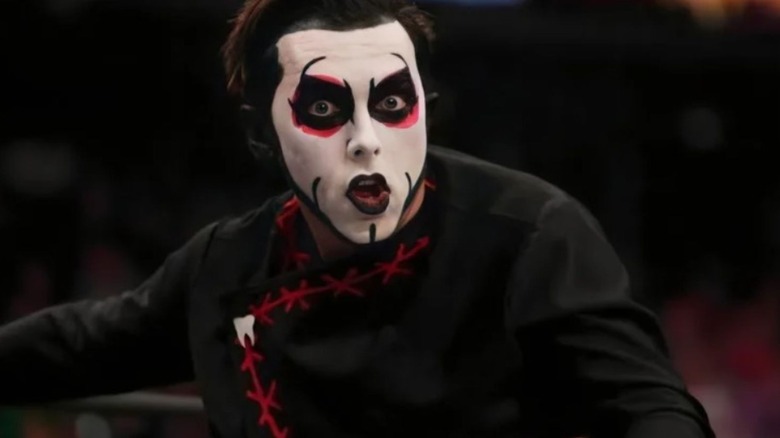Things Allowed In AEW That Are Banned In WWE
Since its inception in 2019, Tony Khan's All Elite Wrestling has been heavily compared to, in Khan's own words, the "evil juggernaut" and the "Harvey Weinstein" of professional wrestling, WWE. For the better part of seven decades, WWE was the only American wrestling promotion with mainstream attention, though many smaller companies, such as TNA, attempted to live up to what the McMahon family had built. Though previously called a "piss-ant company" and a "secondary promotion" by WWE's Chief Content Officer Paul "Triple H" Levesque, AEW has proven its staying power, having already lasted longer than WWE's greatest competition, "WCW Monday Nitro."
With AEW's creation on January 1, 2019, a new era of wrestling within the United States began, and with it came countless comparisons between the two companies. The first big comparison of note between came in May 2019, when it was announced AEW would be airing a prime-time show live on TNT, the network that broadcast "Nitro" during the infamous "Monday Night War" that pit the company against the then-WWF. When "AEW Dynamite" hit airwaves on October 2 of that year, a new generation of now fan-led wars between the companies was born, and the "tribalism" arguments began.
Before AEW celebrates its official five-year anniversary with its Double or Nothing pay-per-view on May 26 in Las Vegas, Nevada, we're looking back at some of the most glaring differences between the newly established company and WWE. From a plethora of spots involving blood that range from demure to egregious, to what wrestlers are allowed to say on television, even to merchandise, there are quite a few things that set AEW apart from its historic competitor.
PARTNERING WITH OTHER PROMOTIONS
One of the most interesting differences between AEW and WWE is the fact the former allows its talent to wrestle for other promotions across the world. Most notably, as of this writing, Jon Moxley (the former Dean Ambrose in WWE) is the current IWGP World Heavyweight Champion, and has defended it on AEW television. Moxley recently defendd his title against Powerhouse Hobbs on "Dynamite" and will compete against Konosuke Takeshita at Double or Nothing in a World Title Eliminator Match. Moxley has been competing in New Japan Pro-Wrestling while signed with AEW since 2019, even competing in the company's G1 Climax tournament. Moxley also appeared in Game Changer Wrestling in the United States before signing a contract extension with AEW that no longer allowed him to be scheduled for the more hardcore promotion's shows.
AEW now even hosts a yearly crossover pay-per-view with NJPW, Forbidden Door, which began in 2022. The next Forbidden Door event will be held at the UBS Arena on Long Island on June 30 with the card yet to be set. Last year's show was headlined by Bryan Danielson taking on Kazuchika Okada (before the latter's signing with AEW). AEW has also engaged in wrestler exchanges with Impact Wrestling (now TNA once again), the lucha promotions AAA and CMLL, and most recently World Wonder Ring STARDOM, whose joshi performers will supposedly have a role at Forbidden Door 2024.
In WWE, talent are only allowed to wrestle for WWE. It would be unheard of for a wrestler like Seth Rollins or Charlotte Flair to compete overseas in NJPW. WWE has briefly partnered with TNA for one-offs involving women in the past few years, with former TNA Knockouts World Champion Jordynne Grace appearing in the 2024 Royal Rumble as well as former WWE Diva-turned-Knockout Mickie James bringing the championship to the 2022 Rumble match, but WWE talent have not appeared on the former Impact brand while under contract with the company, and are banned from doing so.
BLOOD
One huge difference between AEW and WWE many fans noticed immediately was the copious use of blood on "Dynamite" as well as AEW's pay-per-views, as compared to WWE's weekly shows and premium live events. A comment from former WWE Chairman Vince McMahon about AEW's matches featuring "blood and guts" even lead to the creation of the newer company's "Blood & Guts" matches, an even more hardcore take on the classic WarGames match, most recently seen on a July 2023 episode of "Dynamite."
Blood is seen almost weekly on AEW television. Will Ospreay's face was busted open on the go-home episode of "Dynamite" before Double or Nothing at the hands of AEW International Champion Roderick Strong; the week prior, AEW World Champion Swerve Strickland's face was cut open, and his own blood wiped on a photograph of the champion and his family, at the hands of challenger Christian Cage. Strickland has been involved in spots involving blood often in recent months, including an extreme example that shocked fans and the rest of the wrestling world when his opponent at AEW Full Gear, "Hangman" Adam Page, drank his blood during a spot in a Texas Death Match.
In WWE, the act of "blading," or a talent purposefully causing themselves to bleed with a concealed razorblade or sharp object, was banned from the company in 2008 following a spot where Shawn Michaels cut himself too deeply in a match against now-AEW talent Chris Jericho. Following the match, WWE made the switch to become a TV-PG rated program, and wrestlers were no longer allowed to bleed on purpose. That's not to say bleeding doesn't happen by accident on WWE programming, but wrestlers are quickly checked in on to avoid a match becoming too bloody. While WWE does appear to be softening somewhat on this stance during "the Paul Levesque Era" — as demontrated by the bloody beatdown of Cody Rhodes at the hand of Dwayne "The Rock" Johnson ahead of their tag team match at WrestleMania 40 — AEW still uses "the crimson mask" much more frequently than its competitor, and has showcased hardcore spots and weapons that WWE would never even consider.
LANGUAGE
Similar to use of blood, with WWE's softer television rating, cursing is also used sparingly as compared to AEW. Ahead of WrestleMania 40, it was reported that WWE President Nick Khan, Levesque, and the company's executive vice president of talent sent out an internal memo to talent that they should not curse, not even on social media. The note reportedly caused issues with some talent, as they believed The Rock (who was cussing up a storm during his promos, particularly online) was getting special treatment without the company, which some perceived as a double standard. WWE has also been known for its "banned terms" for years, with former chairman McMahon despising the term "wrestler" and opting his talent refer to themselves as "superstars" and the fans as the "WWE Universe." AEW does not seem to be following any set of banned terms.
Khan has previously been reluctant to put harsh restrictions on his talent from swearing entirely. Some cursing is featured on "Dynamite" and "AEW Collision" on TBS and TNT, but is sometimes censored on the broadcast. Those watching the shows on Fite and of course, in the live audience, will hear everything, however. Warner Bros. Discovery reportedly had become less tolerant of profanity, and it does seems as though AEW has toned the cursing down somewhat, but colorful language is still more often featured on "Dynamite" than WWE programming.
WHAT'S IN A (INDIE) NAME?
If you've been confused by seeing some of your favorite wrestlers from the independent scene referred to by different names in WWE, you're not alone. The company is known for changing the name of a talent's character so the company is able to trademark the new name for WWE use only. Name changes are not as common in AEW, unless a person's character name is owned by WWE already. For example, House of Black leader Malakai Black was known as Aleister Black in WWE, and had to change the first name of his character when signing with the newer company. Adam Copeland, who went by "Edge" in WWE for most of his career, is now going by his real name in AEW, but can still use his nickname, "Rated R Superstar," as it wasn't previously trademarked. There have been issues previously with this, as Cody Rhodes had to fight for his last name when he wasn't part of the company, due to WWE owning the name "Rhodes."
While a talent can certainly undergo a name change in AEW, it's not as common as in WWE. Khan seems fine with keeping his stars' names as they were known on the indie scene when they sign with his company, particularly given how frequently his booking relies on previously established connections between a performer and their existing fan base. In recent years, AEW has filed for many trademarks, but they are mostly for factions within the company or names of pay-per-views or match types, rather than characters.
SELLING MERCHANDISE
Since AEW does not usually trademark the character names of its talent, wrestlers are able to sell their own merchandise with little to no problem. AEW has its own online shop and sells its merchandise at events, but many wrestlers, such as Danhausen, sell merch on the side, on websites like ProWrestlingTees. A simple Google search for the website pulls up not just AEW-related merchandise, but New Japan Pro-Wrestling, Bullet Club merch, and other wrestlers' stores. Sites offer merchandise like shirts to be sold directly from the wrestlers themselves, and the wrestlers receive most, if not all, of the profits from the items sold.
With WWE, stars are only able to have their merchandise sold on WWE's online shop, as well as through Fanatics, because the company owns the rights to their characters. Talent receive a cut of their merchandise sold and get royalty checks. WWE outlines this policy explicitly on their corporate website, saying: "We own the rights of substantially all of our characters and exclusively license the rights we do not own through agreements with our Superstars." This difference is often cited as a big factor in a wrestler making a decision between companies, as some want their own freedoms as compared to their character and likeness being owned by a company.
